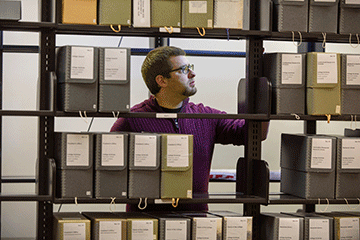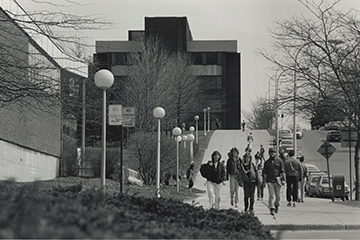
05/19/2020
The deadly COVID-19 virus has radically altered the lives and plans of people all over the world, including many people with a connection to the SUNY Cortland campus.
For the SUNY Cortland community, there’s a feeling that history is happening.
Now, Memorial Library’s College Archives is preparing to document stories about the COVID-19 pandemic told by faculty, staff, students, alumni and others with ties to SUNY Cortland.
These personal experiences chronicled in “COVID-19: the SUNY Cortland Stories” will be preserved by the College Archives and made available publicly on Digital Commons@Cortland.
“We’re mostly just collecting their recollections,” said Jeremy Pekarek, university archivist and instructional services librarian.
“These are just about what is going through your mind right now, what are you doing in the moment. We are hoping to preserve these stories while also giving insight into how the campus reacted to these difficult times.”
Experiences related to COVID-19 may include personal and professional reflections such as journals or diary entries or even photographs. Submitted materials to the archive must be original work. Reproductions or third-party materials will not be accepted.
Guidelines for donating the artifacts are as follows:
- A documentation form can be used to submit archival materials.
- Twenty-five megabytes (MB) is the maximum total in digital file size the form can accept of both documents and images combined.
- There is no immediate deadline to send in materials.
- No page count is required, but keep in mind the maximum file size of 25 megabytes noted above.
- Written documentation should be submitted preferably in a PDF or Microsoft Word format.
- Photographs or other images should preferably be formatted as digital images as either a JPEG or TIFF.
- The College Archives currently is not accepting audio or video materials.
- Persons submitting their records must check an agreement allowing the archives to preserve and make them available online at Digital Commons@Cortland.
- Submissions must be original work. Reproductions or third-party materials are prohibited.
The idea to gather COVID-19 stories was first discussed in April during a College Archives Steering Committee meeting.
“However, this archives initiative is something a lot of campuses are doing,” Pekarek said.
The steering committee decided not to impose a deadline for accepting materials, giving people the time to let ideas about the viral outbreak’s impact percolate in their minds.
“The pandemic is history that’s unfolding right now,” Pekarek said. “This request is intended to give you time to submit something organically in the moment, or it allows you to take time to reflect on this situation and submit at your leisure when you are ready.

“It’s a bit tough for a historian to comment on the present or the future,” said SUNY Cortland assistant professor of history Evan Faulkenbury. “We aren’t very good at that.
“But I can look back to the 1918 flu pandemic, and during that era, we really didn’t do a good job of saving primary documents or recording personal stories. And in fact, the federal government back then tried to keep a lid on how devastating the pandemic was. And that certainly has echoes for today as we have a White House administration today that continues to distort information. So, it’s imperative that we do a better job this time around collecting primary sources and recording oral histories so we can leave plenty of evidence for the coming generations about what it was really like. If we don’t, then others will twist history. And hopefully, with all this evidence, we can shift our collective, national thinking to being better prepared for pandemics in the future.”
The campus community is welcome to continue to share their stories after the College Archives is done actively seeking them.
“We purposely left out collecting audio and visual recordings because I don’t want to infringe on a class project a faculty member is going to do next year,” Pekarek said.
Faulkenbury is planning a theme for one Spring 2021 class to develop audio and visual materials as the students work closely with people affiliated with SUNY Cortland to document their personal experiences throughout the pandemic.
Faulkenbury wants to find a wide array of voices, included administration, faculty, staff, current students, alumni and Cortland community members with whom the class can interact.
“We will work with the SUNY Cortland College Archives to document, preserve and share these oral histories, and they will be saved for all time so that future Red Dragons can explore this time period,” he said.
For the final class project, Faulkenbury envisions that his students could weave together the oral histories, perhaps in a short podcast series, or as radio broadcasts, or in a short, documentary film.
“We’ll want to tell the stories and get the word out there about this resource,” Faulkenbury said of the COVID-19 collection.
Pekarek expressed gratitude to those who will be sharing their experiences.
“These stories will be preserved by the College Archives and will help contribute to the overall documentation,” he said.
Additional questions may be directed to the College Archives at Library.Archives@Cortland.edu or individuals may browse the College Archives Research Guide to learn more about the university’s current digital collections.